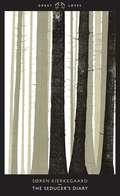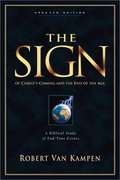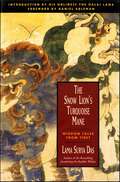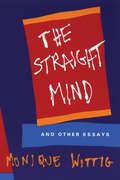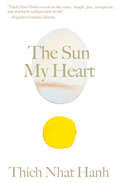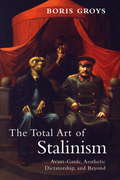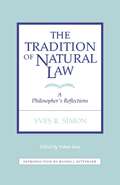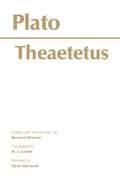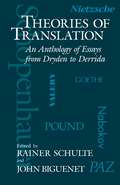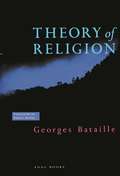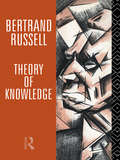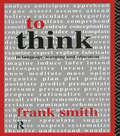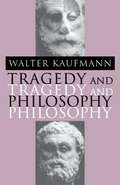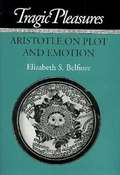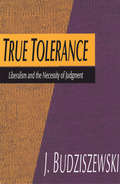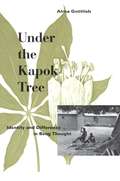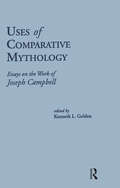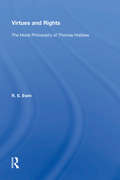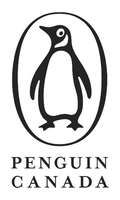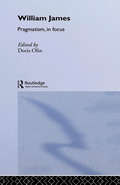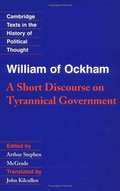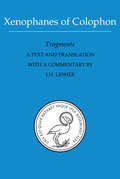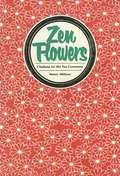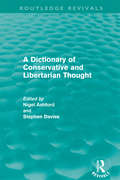- Table View
- List View
The Seducer's Diary (Penguin Great Loves)
by Soren KierkegaardJohannes is an aesthete, dedicated to creating the possibility of seduction through the careful manipulation of young women. He stealthily pursues the innocent Cordelia until she becomes increasingly drawn to him. But when she is ready to give herself completely, she realizes she may have got everything wrong. United by the theme of love, the writings in the Great Loves series span over two thousand years and vastly different worlds. Readers will be introduced to love’s endlessly fascinating possibilities and extremities: romantic love, platonic love, erotic love, gay love, virginal love, adulterous love, parental love, filial love, nostalgic love, unrequited love, illicit love, not to mention lost love, twisted and obsessional love….
The Sign
by Robert Van KampenRobert Van Kampen takes the Scripture at face value and tells of the dooming end of age and the biblical prophecy concerning the last days.
The Snow Lion's Turquoise Mane: Wisdom Tales from Tibet
by Surya DasTales of enlightenment that stem from the centuries-old oral Tibetan tradition, collected by one of the foremost American Buddhist teachers and scholars.Introduction by His Holiness the Dalai LamaThis remarkable book brings together more than 150 authentic Buddhist teaching tales from the Hidden Kingdom of Tibet—most never before translated into English. These captivating stories, legends and yarns—passed orally from teacher to student—capture the vibrant wisdom of an ancient and still-living oral tradition. Magical, whimsical, witty and ribald, The Snow Lion’s Turquoise Mane unfolds a luminous vision of a universe where basic goodness, harmony, and hope prevail.“This collection of more than 150 stories is the only such large anthology in the field of either Tibetan Buddhism or Himalayan folk and fairy tales, and provides unique reading material for both adults and children.” —Mu Soeng Sunim, Tricycle: The Buddhist Review“These wonderful stories of wandering yogis and yak herders echo with uncommon sense and deep wisdom.” —Rick Fields, author of How the Swans Came to the Lake
The Straight Mind: And Other Essays
by Monique WittigThese political, philosophical, and literary essays mark the first collection of theoretical writing from the acclaimed novelist and French feminist writer Monique Wittig.&“Among the most provocative and compelling feminist political visions since The Second Sex. These essays represent the radical extension of de Beauvoir&’s theory, its unexpected lesbian future. Wittig&’s theoretical insights are both precise and far-reaching, and her theoretical style is bold, incisive, even shattering.&”—Judith Butler, Johns Hopkins University
The Sun My Heart: The Companion to The Miracle of Mindfulness (Thich Nhat Hanh Classics)
by Thich Nhat HanhThe Sun My Heart is one of Thich Nhat Hanh’s most beloved books. It was written as a sequel to Miracle of Mindfulness and contains the journey, on the path of everyday practice, from mindfulness to insight in an informational, conversational manner. Using the objects and events of everyday life in his hermitage in Plum Village—the gradual settling of the pulp in a glass of apple juice or the wind blowing into the room and scattering papers about—Thich Nhat Hanh draws from Buddhist psychology, epistemology, and the world of contemporary literature and science to guide the reader along the path of clarity and understanding.This book can be read straight through, but is also designed to be opened randomly and experienced chapter by chapter, paragraph by paragraph. Thich Nhat Hanh suggests in the Introduction that The Sun My Heart "prefers to be a friend rather than a book. You can take it with you on the bus or subway as you do your coat or your scarf. It can give you small moments of joy at any time."
The Total Art of Stalinism
by Boris Groys Charles RougleFrom the ruins of communism, Boris Groys emerges to provoke our interest in the aesthetic goals pursued with such catastrophic consequences by its founders. Interpreting totalitarian art and literature in the context of cultural history, this brilliant essay likens totalitarian aims to the modernists' goal of producing world-transformative art. In this new edition, Groys revisits the debate that the book has stimulated since its first publication.From the Trade Paperback edition.
The Tradition of Natural Law: A Philosopher's Reflections
by Yves R. Simon Vukan KuicAvailable in a new digital edition with reflowable text suitable for e-readersThe tradition of natural law is one of the foundations of Western civilization. At its heart is the conviction that there is an objective and universal justice which transcends humanity’s particular expressions of justice. It asserts that there are certain ways of behaving which are appropriate to humanity simply by virtue of the fact that we are all human beings. Recent political debates indicate that it is not a tradition that has gone unchallenged: in fact, the opposition is as old as the tradition itself. By distinguishing between philosophy and ideology, by recalling the historical adventures of natural law, and by reviewing the theoretical problems involved in the doctrine, Simon clarifies much of the confusion surrounding this perennial debate. He tackles the questions raised by the application of natural law with skill and honesty as he faces the difficulties of the subject. Simon warns against undue optimism in a revival of interest in natural law and insists that the study of natural law beings with the analysis of “the law of the land.” He writes not as a polemicist but as a philosopher, and he writes of natural law with the same force, conciseness, lucidity and simplicity which have distinguished all his other works.
Theaetetus
by Plato Bernard Williams Myles Burnyeat M. J. LevettM. J. Levett's elegant translation of Plato's Theaetetus, first published in 1928, is here revised by Myles Burnyeat to reflect contemporary standards of accuracy while retaining the style, imagery, and idiomatic speech for which the Levett translation is unparalleled. Bernard William's concise introduction, aimed at undergraduate students, illuminates the powerful argument of this complex dialogue, and illustrates its connections to contemporary metaphysical and epistemological concerns.
Theories of Translation: An Anthology of Essays from Dryden to Derrida
by Rainer Schulte and John BiguenetSpanning the centuries, from the seventeenth to the twentieth, and ranging across cultures, from England to Mexico, this collection gathers together important statements on the function and feasibility of literary translation. The essays provide an overview of the historical evolution in thinking about translation and offer strong individual opinions by prominent contemporary theorists. Most of the twenty-one pieces appear in translation, some here in English for the first time and many difficult to find elsewhere. Selections include writings by Scheiermacher, Nietzsche, Ortega, Benjamin, Pound, Jakobson, Paz, Riffaterre, Derrida, and others. A fine companion to The Craft of Translation, this volume will be a valuable resource for all those who translate, those who teach translation theory and practice, and those interested in questions of language philosophy and literary theory.
Theory Of Religion
by Robert Hurley Georges BatailleTheory of Religion brings to philosophy what Georges Bataille's earlier book The Accursed Share brought to anthropology and history, namely, an analysis based on notions of excess and expenditure. No other work of Bataille's, and perhaps no other work anywhere since Weber's Protestant Ethic and the Spirit of Capitalism, has managed to draw so incisively the links between man's religious and economic activities. <p><p> "Religion," according to Bataille, "is the search for a lost intimacy." In a brilliant and tightly reasoned argument, he proceeds to develop a "general economy" of man's relation to this intimacy: from the seamless immanence of animality to the shattered world of objects and the partial, ritual recovery of the intimate order through the violence of the sacrifice. Bataille then reflects on the archaic festival, in which he sees not only the glorious affirmation of life through destructive consumption but also the seeds of another, more ominous order -- war. <p> Bataille then traces the rise of the modern military order, in which production ceases to be oriented toward the destruction of a surplus and violence is no longer deployed inwardly but is turned to the outside. In these twin developments one can see the origins of modern capitalism.
Theory of Knowledge: The 1913 Manuscript
by Bertrand Russell Kenneth Blackwell Elizabeth Ramsden EamesTheory of Knowledge gives us a picture of one of the great minds of the twentieth century at work. It is possible to see the unsolved problems left without disguise or evasion. Historically, it is invaluable to our understanding of both Russell's own thought and his relationship with Wittgenstein.
To Think: In Language, Learning and Education
by Frank SmithFirst Published in 1992. Routledge is an imprint of Taylor & Francis, an informa company.
Tragedy And Philosophy
by Walter KaufmannA critical re-examination of the views of Plato, Aristotle, Hegel and Nietzsche on tragedy. Ancient Greek tragedy is revealed as surprisingly modern and experimental, while such concepts as mimesis, catharsis, hubris and the tragic collision are discussed from different perspectives.
Tragic Pleasures: Aristotle on Plot and Emotion
by Elizabeth BelfioreElizabeth Belfiore offers a striking new interpretation of Aristotle's Poetics by situating the work within the Aristotelian corpus and in the context of Greek culture in general. In Aristotle's Rhetoric, the Politics, and the ethical, psychological, logical, physical, and biological works, Belfiore finds extremely important but largely neglected sources for understanding the elliptical statements in the Poetics. The author argues that these Aristotelian texts, and those of other ancient writers, call into question the traditional view that katharsis in the Poetics is a homeopathic process--one in which pity and fear affect emotions like themselves. She maintains, instead, that Aristotle considered katharsis to be an allopathic process in which pity and fear purge the soul of shameless, antisocial, and aggressive emotions. While exploring katharsis, Tragic Pleasures analyzes the closely related question of how the Poetics treats the issue of plot structure. In fact, Belfiore's wide-ranging work eventually discusses every central concept in the Poetics, including imitation, pity and fear, necessity and probability, character, and kinship relations. Originally published in 1992. The Princeton Legacy Library uses the latest print-on-demand technology to again make available previously out-of-print books from the distinguished backlist of Princeton University Press. These paperback editions preserve the original texts of these important books while presenting them in durable paperback editions. The goal of the Princeton Legacy Library is to vastly increase access to the rich scholarly heritage found in the thousands of books published by Princeton University Press since its founding in 1905.
True Tolerance: Liberalism and the Necessity of Judgment
by Jay BudziszewskiIn contemporary liberal thought, "tolerance" has come to be redefined as a synonym for ethical neutrality: refusal to judge among competing views of goods and evils. The result of this extreme relativism has been a foundations crisis in law, politics, education, and other areas of social life. In this lucidly written and brilliantly argued volume, J. Budziszewski attempts to reserve the self-destruction of modern liberalism by showing that true tolerance is not only consistent with taking stands about objective goods and evils, but actually requires doing so.Tolerance, falsely understood as ethical neutrality, has the paradoxical effect of crippling policy choice by divesting it of the moral and practical framework on which it depends. By painstakingly and exhaustively dissecting each of the many neutralist arguments, Budziszewski demonstrates that real neutrality is logically impossible. Confronted by alternative views, the neutralist at best obscures his own underlying judgments, and at worst abandons all possible defense against fanatics who oppose both true equality and true tolerance.True Tolerance is both a rigorous critique, and a polemic undertaken in the name of a positive, twenty-first century vision of liberalism. Budziszewsky outlines a view of true tolerance that assumes a relationship with an older liberal tradition and a codependence with other virtues, including humility, mercy, charity, respect, and courtesy. This vision is rooted in historical experience and rational conviction about what is good. In the spirit of liberal and classical theorists of virtue from Aristotle to John Locke to Alasdair MacIntyre, the virtue of true tolerance is much more than a readiness to follow known rules; it includes a developed ability to distinguish good rules from bad, and to choose rightly even where there are no rules or where rules seem to contradict each other. Accessibly written and intended for a wide readership, True Tolerance will be of special interest to political theorists and activists, and to sociologists and philosophers.
Under the Kapok Tree
by Alma GottliebIn this companion volume to Parallel Worlds, Alma Gottlieb explores ideology and social practices among the Beng people of Côte d'Ivoire. Employing symbolic and postmodern perspectives, she highlights the dynamically paired notions of identity and difference, symbolized by the kapok tree planted at the center of every Beng village. "This book merits a number of readings. . . . An experiment in ethnography that future projects might well emulate. " —Clarke K. Speed, American Anthropologist "[An] evocative, rich ethnography. . . . Gottlieb does anthropology a real service. " —Misty L. Bastian, American Ethnologist "Richly detailed. . . . This book offers a nuanced descriptive analysis which commands authority. " —Elizabeth Tonkin, Man "Exemplary. . . . Gottlieb's observations on identity and difference are not confined to rituals or other special occasions; rather she shows that these principles emerge with equal force during daily social life. " —Monni Adams, Journal of African Religion "[An] excellent study. " —John McCall, Journal of Folklore Research
Uses of Comparative Mythology: Essays on the Work of Joseph Campbell (Routledge Library Editions: Myth Ser. #3)
by Kenneth L. GoldenThis collection, first published in 1992, offers critical-interpretive essays on various aspects of the work of Joseph Campbell (1904-1987), one of a very few international experts on myth. Joseph Campbell examines myths and mythologies from a comparative point of view, and he stresses those similarities among myths the world over as they suggest an existing, transcendent unity of all humankind. His interpretations foster an openness, even a generous appreciation of, all myths; and he attempts to generate a broad, sympathetic understanding of the role of these 'stories' in human history, in our present-day lives, and in the possibilities of our future.
Virtues And Rights: The Moral Philosophy Of Thomas Hobbes
by R. E. EwinThis book is a timely interpretation of the moral and political philosophy of Thomas Hobbes. Staying close to Hobbes's text and working from a careful examination of the actual substance of the account of natural law, R. E. Ewin argues that Hobbes well understood the importance of moral behavior to civilized society. This interpretation stands as a much-needed corrective to readings of Hobbes that emphasize the rationally calculated, self-interested nature of human behavior. It poses a significant challenge to currently fashionable game theoretic reconstructions of Hobbesian logic. It is generally agreed that Hobbes applied what he took to be a geometrical method to political theory. But, as Ewin forcefully argues, modem readers have misconstrued Hobbes's geometric method, and this has led to a series of misunderstandings of Hobbes's view of the relationship between politics and morality. Important implications of Ewin's reading are that Hobbes never thought that "the war of each against all" was an empirical possibility for citizens; that his political theory actually presupposes moral agency; and that Hobbes's account of natural law forces us to the conclusion that Hobbes was a virtue theorist. This major contribution to Hobbes studies will be praised and criticized, welcomed and challenged, but it cannot be ignored. All philosophers, political theorists, and historians of ideas dealing with Hobbes will need to take account of it.
Voltaire's Bastards: The Dictatorship Of Reason In The West
by John Ralston SaulVoltaire's Bastards: The Dictatorship of Reason in the West is a sweeping and provocative exploration of nothing less than the political, economic, social, and cultural origins of Western society. With great daring and originality, John Ralston Saul dissects the contradictions, delusions, and illusions that have brought the world to the brink of confusion and crisis, and shatters the myths surrounding the icons and institutions that we have been taught to revere and cherish.
William James Pragmatism in Focus (Philosophers In Focus Ser.)
by Doris OlinThis book presents William James's Pragmatism together with critical commentary and focuses on the theories of meaning and truth central to Pragmatism. It includes several articles three of which were roughly contemporaneous with the publication of Pragmatism.
William of Ockham: A Short Discourse on the Tyrannical Government
by William Of Ockham Arthur Stephen Mcgrade John KilcullenWilliam of Ockham (c. 1285-c. 1387) was the most eminent theologian and philosopher of his day, a Franciscan friar who came to believe that the Avignonese papacy of John XXII had set out to destroy the religious ideal on which his order was based: the complete poverty of Christ and the Apostles. A Short Discourse on Tyrannical Government is an attack on the claims of the medieval Church, specifically the papacy, to universal spiritual and secular power. Written at the time of the emergence of the European nation-states, Ockham's work issued a direct hard-hitting challenge to the claims of limitless papal power. The text is accompanied by a full bibliography, a chronology and an introduction setting his work in its intellectual and historical context.
Wise Choices, Apt Feelings: A Theory of Normative Judgment
by Allan GibbardThis book examines some of the deepest questions in philosophy: What is involved in judging a belief, action, or feeling to be rational? What place does morality have in the kind of life it makes most sense to lead? How are we to understand claims to objectivity in moral judgments and in judgments of rationality? When we find ourselves in fundamental disagreement with whole communities, how can we understand our disagreement and cope with it? To shed light on such issues, Allan Gibbard develops what he calls a “norm-expressivistic analysis” of rationality. He refines this analysis by drawing on evolutionary theory and experimental psychology, as well as on more traditional moral and political philosophy. What emerges is an interpretation of human normative life, with its quandaries and disputes over what is rational and irrational, morally right and morally wrong. Judgments of what it makes sense to do, to think, and to feel, Gibbard argues, are central to shaping the way we live our lives. Gibbard does not hesitate to take up a wide variety of possible difficulties for his analysis. This sensitivity to the true complexity of the subject matter gives his treatment a special richness and depth. The fundamental importance of the issues he addresses and the freshness and suggestiveness of the account he puts forward, along with his illuminating treatment of aspects of sociobiology theory, will ensure this book a warm reception from philosophers, social scientists, and others with a serious interest in the nature of human thought and action.
Xenophanes of Colophon
by James LesherXenophanes of Colophon was a philosophical poet who lived in various cities of the ancient Greek world during the late sixth and early fifth centuries BC. In this book, James Lesher presents the Greek texts of all the surviving fragments of Xenophanes' teachings, with an original English translation on facing pages, along with detailed notes and commentaries and a series of essays on the philosophical questions generated by Xenophanes' remarks. Also included are English translations of all the ancient testimonia relating to Xenophanes' life and teachings, and a discussion of how many of the testimonia pose the impediments to achieving a consistent interpretation of his philosophy.The Xenophanes who emerges in this account fully warrants classification as a philosophical thinker: moral critic and reflective student of nature, critic of popular religious belief and practice, and perhaps the first to challenge claims to knowledge about divine matters and the basic forces at work in nature. As with earlier works in the Pheonix series, this volume aims to make an important portion of Presocratic writing accessible to all those interested in ancient philosophy and the first phase of European natural science. This new paperback edition contains an updated bibliography.
Zen Flowers: Chabana for the Tea Ceremony
by Henry MittwerThis Zen flower arranging book teaches the delicate art of Japanese Chabana--the precursor to ikebana.<P><P>Up to now, with the exception of Okakura Kakuzo's excellent account of flowers used in the art of Chanoyu in his delightful The Book of Tea, almost nothing has been available on the subject. To my knowledge, the present volume is the only book written in English that is wholly devoted to the special form of flower arrangement called Chabana.Chabana is a type of flower arrangement that originated in the tea room . Chabana is not only for decoration, for symbolic representation, or for abstract expression of the self. 2,500years ago, Chabana has something in common with one of Shakyamuni Buddha's sermons. Buddha lightly picked a single bloom from a basketful of flowers offered to Him by one of the multitude who came to hear His sermon. Buddha slowly, silently, held up the flower before the congregation. Among the gathering was one of His disciples, Mahakasyapa, who gently smiled as he apprehended the Buddha's gesture. Chabana may not be a flower arrangement having a Zen-like mission, but it certainly is a flower arrangement appreciated by a mind nourished with the Zen principles of simplicity and directness.
A Dictionary of Conservative and Libertarian Thought (Routledge Revivals)
by Stephen Davies Nigel AshfordFirst published in 1991, this is a reissue of the path-breaking Dictionary of Conservative and Libertarian Thought, the first book to examine the ideals and arguments produced by the intellectual traditions of both conservatism and classical liberalism. Covering the ideas of many such distinguished thinkers as Hayek, Scruton, Friedman and Buchanan, the volume provides a valuable survey of the historical development of both schools of thought in all of the major western countries and their contributions to contemporary debates. From American Conservatism to French Liberalism, Invisible Hand to Organic Society, from Scientism to Scepticism and Utopianism to Voluntarism, this is a vital work whose reissue will be welcomed as much by the keen layperson as by students of political science, the history of philosophy, economics and public policy.
